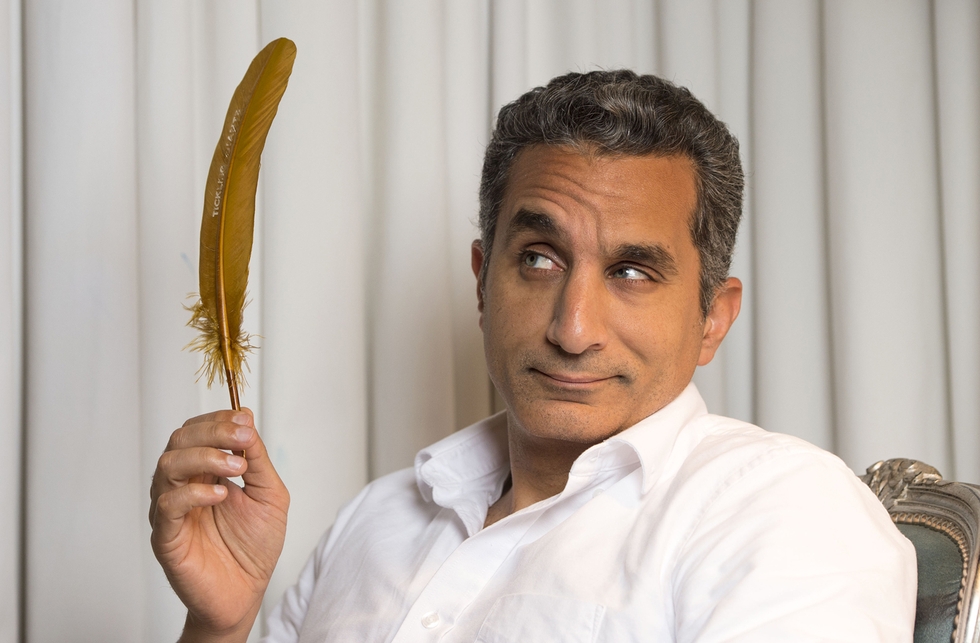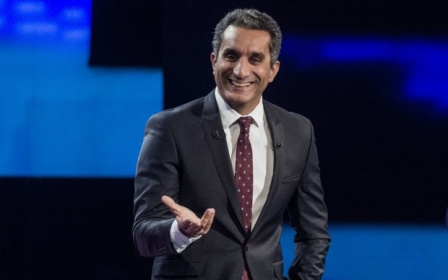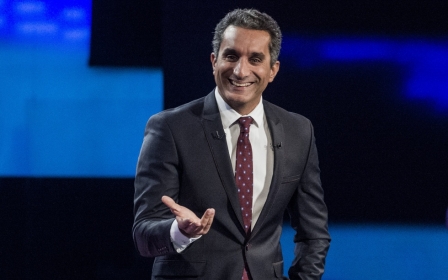Egyptian comic Bassem Youssef takes on America

NEW YORK, United States – Back in the heady days of the Arab Spring, record numbers of Egyptians tuned in to Bassem Youssef’s weekly current affairs show, which broke new ground by satirising the then-ruling Muslim Brotherhood and the military-backed government that followed.
Today, the 43-year-old yearns for that audience of 30 million viewers. Just as the Tahrir Square uprisings did not end the way many protesters desired, Youssef’s comedy brought him powerful enemies in Egypt’s ruling elites and he was hounded out of the country.
Now a Los Angeles denizen, the heart surgeon-turned-comic is publishing books, appearing on television and in a documentary, and tweeting to nearly 10 million followers in a bid to re-boot his career as an Arab funny man in America.
His English is near perfect; but US audiences are still not quite buying it.
“Right now, I live in Los Angeles, so I’m going to give you a typical Hollywood answer: I'm working on different projects,” Youssef told Middle East Eye, putting on a California drawl to accentuate his point.
He is the first to admit how competitive and fickle tinsel town is for newcomers. He attends auditions and does voice-overs while studying self-help guides on writing and pitching screenplays, hoping to “catch a break”.
“It is a typical Hollywood story” of being “rejected once, rejected twice,” he said. “At the end of the day, you’re at the mercy of network or studio executives. Maybe there is something soon. I don’t want to jinx it.”
Right now, I live in Los Angeles, so I’m going to give you a typical Hollywood answer: I'm working on different projects
- Bassem Youssef, comedian
Tickling Giants
He is not slacking off. Last year, he poked fun at America’s election campaigns in a 10-part series, The Democracy Handbook, for Fusion TV. His book, Revolution for Dummies: Laughing Through the Arab Spring, was published in March.
A 111-minute documentary Tickling Giants, directed by Sara Taksler, narrates his rise and fall in Egypt. The film, which gained a 78 percent score on the aggregator Metacritic, can be viewed via Amazon and other sites from 13 June.
It showcases some of Youssef’s finest moments in his Egyptian satire, Al-Bernameg, or “The Programme,” which borrowed heavily from the US mock news programme The Daily Show, hosted by Jon Stewart, whose rapid, energetic delivery doubtless influenced Youssef.
The Arabic-language show began as five-minute YouTube skits that aired in the weeks after President Hosni Mubarak was toppled by popular protests in early 2011. It became the Middle East’s first online-to-television conversion in Ramadan of that year.
Youssef memorably donned a supersized yellow-trimmed hat to lampoon the headgear worn by democratically-elected President Mohammed Morsi, an Islamist, while receiving an honorary degree from a university in Pakistan in 2013.
You better go out and be taken off the air when you’re on top of your game than compromise
- Bassem Youssef, comedian
Mocking Morsi earned Youssef a court summons and charges of insulting the state, which were later dropped. That was nothing compared to the blowback he got for ridiculing President Abdel Fattah al-Sisi, after he and other generals ousted Morsi in a coup that same year.
Youssef brands Sisi a dull-witted “disgrace to the dictators’ club” for his 1950s autocrat tactics. His military junta tried to co-opt Al-Bernameg into an arm of state propaganda and “recreate the cartoonish opposition” of past eras, he said.
“You better go out and be taken off the air when you’re on top of your game than compromise,” he said, flashing piercing grey eyes that hint at both good humour and bitterness. “You lose your self-respect and your viewers before you lose your job.”
He terminated the show under death threats and government pressure in 2014. He packed his bags and took his family out of the country later that year after being fined some $10m for breaching a media contract in a ruling he says was politically motivated.
“Those with authoritarian tendencies are scared of being joked about because what they have is fake respect and fake fear. Satire undermines that; it’s the antidote to fear. When you laugh at someone, you’re not afraid anymore,” said Youssef.
'Egypt turning into North Korea'
Nowadays, in self-imposed exile, he expressed dismay by “watching Egypt turning into North Korea”.
Back home, his fan-base of educated, liberal and secular Egyptians urge him to continue lambasting the government. His cynical wisecracks filled one of the gaps in society that brought Cairenes onto the streets in the first place, they say.
That would be ersatz television, he replies. Al-Bernameg was filmed before a live crowd within rock-hurling distance of Tahrir Square. Reading Facebook posts from friends back home to produce YouTube skits on US soil would be a hollow “novelty,” he added.
There is no shortage of material in his new home. His US-themed gags continue to broach topical themes – notably a stereotyping of Muslims as extremists that grew more pronounced after Donald Trump became president in January.
Sisi’s visit to the White House in April was a show of thin-skinned absolutism, said Youssef.
“It doesn’t matter if you’re from a religious or military authority, if you are the strongest man in the world or how orange your hair is, a joke will get under your skin,” he said, taking a swipe at the coiffed Trump.
Of course, he is not the only comic laying in to the billionaire.
Youssef is a charismatic showman, but back in Cairo, he benefited from the first-mover advantage: The Daily Show was a pre-fabricated template to offer on-screen sarcasm to 95 million Egyptians.
This side of the Atlantic, there is no shortage of comics. There are even established Arab American jokers, such as Dean Obeidallah and Maysoon Zayid, with whole comedy festivals devoted to gags about being mistaken for terrorists.
Still, Youssef is giving it a shot, and the folks back home should cheer that.
“If I have a moderate success here, more Americans will know my story and my background and indirectly you are directing their attention to the Middle East. I’m helping the cause of freedom of expression in my country by making it here,” he said.
Middle East Eye propose une couverture et une analyse indépendantes et incomparables du Moyen-Orient, de l’Afrique du Nord et d’autres régions du monde. Pour en savoir plus sur la reprise de ce contenu et les frais qui s’appliquent, veuillez remplir ce formulaire [en anglais]. Pour en savoir plus sur MEE, cliquez ici [en anglais].




